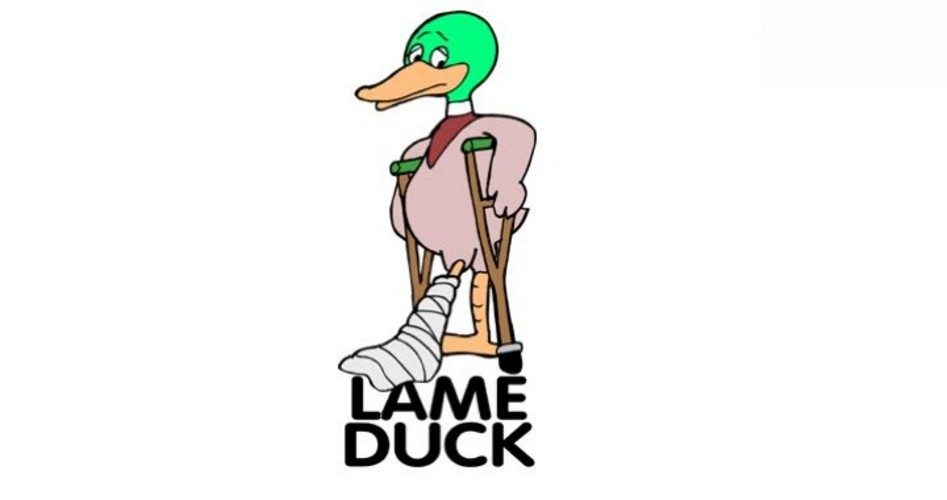
Congress reconvenes on Tuesday in what is dubbed a “lame duck” session. The Constitution does not mention a lame duck session — the session which meets after the November congressional elections and the beginning of the new Congress in January. It says only that “Congress shall assemble at least once in every year.”
President Jimmy Carter produced some laughter at a late 1980 meeting of the Organization of American States (consisting of the nations of the Western Hemisphere), when he told the assembled delegates that he was a “lame duck” president. Carter had just lost the presidential contest to challenger Ronald Reagan, and Carter used the Spanish word, pato cojo, for lame duck to describe his status. What Carter did not realize that expression in many of the Latin American countries refers to a castrated male, and his remark produced snickers.
But a lame duck session of Congress is no laughing matter. Some have questioned whether a Congress, which includes many members who have just been defeated for reelection, should even be voting on any legislation of substance, except in case of an emergency. One of the most significant votes ever taken in a lame duck Congress was in December 1994, when Congress agreed to the creation of the World Trade Organization (WTO).
Testifying before the House Ways and Means Committee in June 1994, Representative Newt Gingrich (R-Ga.) said, “I am just saying that we need to be honest about the fact that we are transferring from the United States at a practical level significant authority to a new organization. This is a transformational moment. I would feel better if the people who favor this would just be honest about the scale of change.”
He continued, “This is very close to Maastricht [a key European Union treaty], and twenty years from now we will look back on this as a very important defining moment. This is not just another trade agreement. This is adopting something which twice, once in the 1940s and once in the 1950s, the U.S. Congress rejected. I am not even saying we should reject it; I, in fact, lean toward it.”
Yet, despite the fact that the American people had swept out of office scores of House members less than a month earlier, Gingrich (the incoming speaker of the House) did not move for putting off the vote, for one month, of one of the most significant pieces of legislation in U.S. history.
Certainly, no such comparable monumental piece of legislation is expected to be considered in this lame duck session, but Congress still is faced with some important work.
First of all, Congress must move quickly to prevent a partial government shutdown, because they failed to pass seven of the 12 individual appropriations bills, which were due on September 30. Republicans had roundly criticized Democrats when the Democrats controlled the House for not completing their appropriations work in a more timely matter, yet under the leadership of Speaker Paul Ryan (58 percent on the Freedom Index of The New American, which scores members of Congress on their fidelity to the Constitution), they also failed to produce a budget on time.
One important spending bill that Congress failed to move on was President Trump’s proposed border wall. The House funding of the Department of Homeland Security included $5 billion for the wall, but the Senate version chipped in only $1.6 billion. These two figures must be reconciled, and after losing control of the House, if the Republicans do not do it now, the Democrats will balk at doing so in January. If anything, the Democrats will insist on no money at all for the wall, partly because they are philosophically opposed to it, and partly to deny Trump a victory on his best-known promise of the 2016 presidential campaign.
Another funding question may involve Trump’s vow to cut off aid to Central American countries who did not stop the caravan of migrants heading north to the United States. Unfortunately, what will not be discussed is why the United States should be giving any aid to any foreign country, and where such an expenditure is authorized in the Constitution.
Now that Senator Jeff Flake (R-Ariz.) is due to leave Congress in January, Trump will be rid of one of his biggest Republican critics. But Flake has said that he would like to push through a provision in the appropriations bills to give Special Counsel Robert Mueller “protection” from being fired by Trump. The Republican leadership does not appear inclined to allow Flake’s amendment to be included in any spending bill, however.
Some sparks might fly over the huge agriculture spending bill. While most Americans think farm bills are about agriculture, the truth is that the biggest part of “farm” bills is the food stamp program. The House passed legislation imposing new work requirements on the program earlier this year, and tightened overall eligibility rules, but the Senate has balked. While most Republicans in the Senate favored the House version, Democrats threatened a filibuster to stop it, and Senate Majority Leader Mitch McConnell has, so far, been unable to muster the 60 votes needed to stop a Democrat filibuster.
Several votes on executive and judicial nominations are expected in the lame duck session. When asked what he expected to highlight the session, Senate Majority Whip John Cornyn (R-Texas) quipped, “Nominations, more nominations.”
Dozens of judicial nominations are still waiting for a Senate floor vote, and Senator Orrin Hatch (R-Utah) has told nominees, “We’re going to do everything we can to get you through before the end of this year.”
Not enough time exists in the lame duck session to hold hearings and vote on a replacement for Attorney General Jeff Sessions, fired by Trump the day after the November election. Hearings for a new attorney general are expected to be quite contentious.
All in all, the lame duck session has plenty on its plate.
Image: Clipart.com



